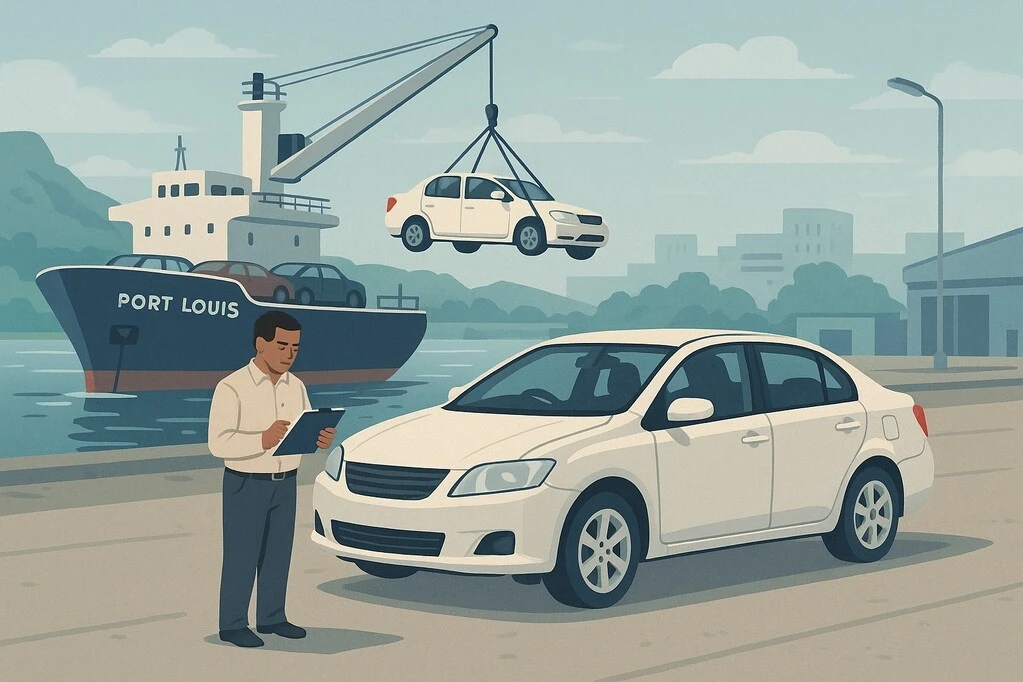Importing a Vehicle to Mauritius: What You Need to Know

If you’re considering importing a vehicle into Mauritius, you’re not alone. Whether you’re relocating, returning home, or looking for a particular model not readily available on the island, bringing in a vehicle from overseas can make sense — provided you understand the process. At AutoCloud, we make things simple by connecting drivers to experienced local import partners who know the system inside out. From permits and inspections to customs clearance and registration, they guide you through each step to ensure your vehicle arrives legally and smoothly. Vehicles can be imported by Mauritian citizens, returning residents, foreigners with valid residence or occupation permits, and licensed businesses or dealerships. In practice, almost all private individuals work through registered import partners or clearing agents who handle the process on their behalf. Generally speaking, most private imports come from Japan, where buyers have access to a wide selection of used vehicles through trusted auctions and exporters. You can import any vehicle provided it is right-hand drive and roadworthy, with original chassis and no major structural damage. However, VAT and duties will apply based on engine capacity and fuel type. While vehicles between 18 and 48 months old may qualify for more favourable duty categories, older vehicles can still be imported but will be taxed accordingly. Before any vehicle is shipped, an import permit must first be obtained locally. This is handled entirely by your chosen import partner, who will manage the full application and documentation process. In addition to the permit, a pre-shipment roadworthiness inspection is mandatory for all used vehicles to ensure the car meets local safety and compliance standards. A police clearance certificate is also required to confirm the vehicle’s legal status and verify that it is not stolen or subject to any restrictions in the country of export. Your import partner will coordinate these inspections and certifications, along with arranging shipping and handling the necessary paperwork to prepare the vehicle for its arrival in Mauritius. Import costs are one of the biggest factors to consider. All duties and taxes are calculated on the vehicle’s CIF value, which includes the cost of the vehicle itself, insurance, and shipping. It’s important to note that duties are not based solely on the purchase price abroad. Duty rates depend on engine size and fuel type. For smaller engines, duties may start at around 15 percent, but for larger capacity combustion vehicles, especially above 1600cc, duties can reach as high as 100 percent of the CIF value. VAT of 15 percent is then applied on top of the full amount, along with port charges, permit fees, and registration costs. Once all charges are included, the total landed cost often comes to double the vehicle’s original overseas price, especially for larger combustion engines. It’s also worth noting that previous incentives for electric and hybrid vehicles have now been removed. Today, electric and hybrid imports follow the same duty structure as combustion vehicles, so the full landed cost should be carefully evaluated. When the vehicle arrives in Port Louis, your import partner will handle Customs clearance, payment of duties and taxes, and submission of all required paperwork. Once cleared, the vehicle must then be registered with the National Transport Authority (NTA) before it can be driven. While your import partner can often assist with guidance, the responsibility for completing the NTA registration, paying road tax, and collecting registration documents generally remains with the customer. For most buyers, importing standard used or new vehicles into Mauritius is often not financially practical once duties, taxes, and other costs are fully factored in. The total landed cost usually far exceeds what’s available on the local market. The main exception is for vintage vehicles, where collectors may wish to import rare or classic models not available locally. To qualify, the vehicle must be at least 40 years old, in roadworthy condition, and right-hand drive. For these limited cases, importing can make sense for enthusiasts. Outside of vintage and classic vehicles, most buyers will find that purchasing through the local market offers far better value. Importing into Mauritius is entirely manageable when handled by experienced professionals. With multiple permits, inspections, police clearance certificates, and taxes involved, most buyers prefer to work with registered import agents who take care of everything and avoid costly mistakes or delays. At AutoCloud, we work with trusted local import partners who handle the full process for you. Whether you’ve already found a car abroad or need help sourcing one, we connect you directly to experts who can guide you through the entire import journey. Start your import journey here:autocloud.mu/import-servicesWho can import a vehicle?
What needs to happen before shipment?
What does it cost to import?
What happens once the vehicle arrives?
Is importing worth it?
Thinking of importing a car?
More Articles
![Best Fuel-Efficient Cars in Mauritius: Save Money at the Pump]()
Best Fuel-Efficient Cars in Mauritius: Save Money at the Pump
Picture your typical Mauritian drive: navigating the morning hustle of Port Louis or winding along the eastern coast at sunrise. ...Read more![Why EVs Might Be Making You More Car Sick]()
Why EVs Might Be Making You More Car Sick
Electric vehicles (EVs) are often praised for their silent, smooth ride, but for many passengers, this futuristic calm is turning ...Read more![Finance Bill 2025: What’s Changing for Vehicle Owners in Mauritius]()
Finance Bill 2025: What’s Changing for Vehicle Owners in Mauritius
The Finance Bill 2025 has officially been released, and for anyone thinking about buying, selling or owning a car in Mauritius, ...Read more



